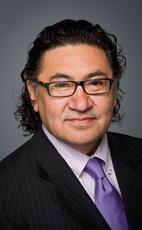Mr. Speaker, it is always an honour and a privilege for me to rise in the House, particularly to speak to the budget.
As everyone knows, the government's budget reflects its choices. Like all of my colleagues on this side of the House, I had a lot of hope for the first Liberal budget. We are quite disappointed because, this time, we were expecting real change. The members opposite are always saying that Canadians voted for real change on October 19, but we have yet to see any. The choices and priorities set out in the budget are rather disappointing.
I have a large riding with huge needs. My riding has always been neglected, forgotten, and underfunded by the federal government. Once again, I have no choice but to express my great disappointment with this budget.
During the election campaign, I spoke about my riding's priorities. For example, there are many seniors in my riding and they have always been one of my biggest priorities. However, the budget does very little for them.
The youth unemployment rate is about two times higher than the national unemployment rate. For many years, we have been proposing measures to help young people find jobs, including a $4,000 tax credit for small businesses that hire young people. This is a reasonable measure that would help young people. These are the kinds of things that concerned me during the election campaign and that still concern me today.
Furthermore, home mail delivery is another important issue in my riding. A northern, rural riding like mine needs this service. The government promised to restore this service, but as members on this side have pointed out many times, this budget does not even contain the words “Canada Post”.
Nonetheless, I think there are many measures in the budget that should be highlighted. For example, the budget talks about shelters for indigenous women. There are about 14 shelters for some 630 communities in Canada. We are all aware of the problems facing indigenous communities, and there are huge needs. However, the budget allocates about $500,000 per community for shelters, which is nowhere near enough.
As I mentioned, in the north, in a riding like mine, construction costs are very high. I do not think $500,000 will be enough. In addition, as the representative for the riding of Abitibi—Baie-James—Nunavik—Eeyou, I must mention that the section in the budget on shelters does not apply to Nunavik or the James Bay area, which are also part of my riding. This is a concrete example of why I am so disappointed.
Forestry is one of the major industries in my riding. I have been bringing up this issue since I became a member of Parliament, nearly five years ago.
Forestry is a major industry in Quebec and in my riding. Tens of thousands of my constituents work in this industry.
Each year, every time I rise to talk about the government's budget, be it the former or the current government, I am disappointed by the lack of measures to provide direct assistance to this industry in my riding. For example, there is nothing here about the forest communities program or the investments in forest industry transformation program. One thing we know for sure is that it is important to invest in innovation and research and development in this industry. That is critical for the jobs in my riding that are tied to forestry.
I also want to raise the subject of employment insurance. This is a particularly tricky issue for my riding. Employment insurance figures and statistics for a riding like mine are pretty complicated and hard to understand. There is no logic to how this works in my riding. The statistics are compiled for three different regions: Nunavik, James Bay, and Abitibi-Témiscamingue. It is crazy because the situation is so different in each of these three regions of northern Quebec, which are part of my riding, that there is no logical way to approach employment insurance there. We should also condemn the government's ongoing tendency to dip into the employment insurance fund. We have condemned that repeatedly, actually.
We need to talk about the parts of this budget that affect indigenous peoples. Once again, disappointment. We have talked about issues facing indigenous peoples a lot in the past few days, but people seem to forget that the needs in this country are so great. It is disappointing to see that the government did not bother to come up with a comprehensive approach to the needs of Canada's first nations. For example, as I pointed out earlier, the budget for housing breaks down to about $300,000 per community per year for the next two years.
Building a house in Nunavik or James Bay costs about $200,000. How can we continue to mitigate the effects of the housing crisis on communities when this budget provides enough funding for just one and half houses per community for the next two years? The fact that the government is not taking a holistic approach to indigenous issues is troubling.
There are many points I wanted to raise. Indigenous languages are once again being ignored. Out of the 52 indigenous languages that are still spoken today, only three will survive and flourish, and mine is one of them. I am privileged that I can say that. Again, we all know the importance of language in indigenous communities and the importance of cultural continuity among aboriginal youth. That is one reason why the suicide rate is so high in those communities. Our indigenous youth have become lost between two worlds, between the indigenous world on the one hand, and the western world on the other hand. One way to help them would be to address the language issues that are so important to our communities.
I wish I could go on, for I am just getting started, but I will take any question members may have.

